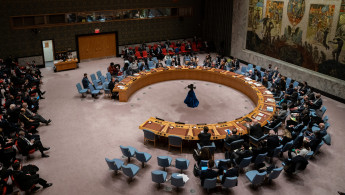UN stresses key communications role to combat disinformation on peacekeeping operations
The UN Security Council said Tuesday that more needs to be done to counter disinformation and misinformation about the UN’s 12 peacekeeping operations, which have faced growing attacks especially on social media.
A Brazilian-drafted presidential statement approved by all 15 council members said the UN must “improve the culture of strategic communications across civilian, military and police components” of peacekeeping missions in order to protect civilians — a key mandate for the UN’s 90,000 peacekeepers in Africa, the Middle East, Asia and Europe.
The council noted “with great concern the increasing amount of disinformation and misinformation directed against United Nations peacekeeping operations, which may negatively impact missions and peacekeepers.”
Brazilian Foreign Minister Carlos França, whose country holds the council presidency this month and chaired Tuesday's meeting, said that “strategic communications are essential for a successful peacekeeping operation.”
UN Secretary-General Antonio Guterres told the council that the world in which peacekeepers operate “is more hazardous today than any time in recent memory,” with geopolitical tensions reverberating locally and conflicts “more complex and multi-layered.”
“Peacekeepers are facing terrorists, criminals, armed groups and their allies — many with access to powerful modern weapons, and many with a vested interest in perpetuating the chaos in which they thrive,” the UN chief said.
But, he added, “The weapons they wield are not just guns and explosives. Misinformation, disinformation, and hate speech are increasingly being used as a weapon of war.”
Guterres said a recent survey found that nearly half of all UN peacekeepers feel misinformation and disinformation severely affect their work and threaten their safety and security.
As an example of false information spreading “like wildfire,” Guterres said a fake letter alleging that UN peacekeepers in Mali were collaborating with armed groups “went viral on WhatsApp and was picked up by national media.” It stirred up hostility and resentment against peacekeepers and made their efforts to protect civilians even harder, he said.
Lt. Gen. Marcos Da Costa, commander of the peacekeeping force in Congo, told the council that it operates in a country where successive surveys find “an overall poor perception” among the population about the mission’s relevance in improving their security.
“Anti-mission sentiment prevails in certain parts of the country that even prevent some of our deployments,” he said. “Unfair speeches by several actors against the mission put in risk the safety of our peacekeepers. The extensive use of social media by armed groups and other spoilers undermines the confidence in the UN”
He said these armed militias “use regular information warfare techniques” and their fake news diffusing through messaging and social media is difficult to distinguish from reality.
“These emerging technologies are driving a fundamental change to the character of the war, and peace operations are already being affected,” Da Costa said.
Guterres said the UN is moving to improve communications in peacekeeping operations between uniformed and civilian personnel, seek military and police officers skilled in communicating, and work with tech and media companies and member states to collect and share best practices.





 Follow the Middle East's top stories in English at The New Arab on Google News
Follow the Middle East's top stories in English at The New Arab on Google News


